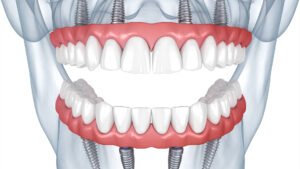Full Mouth Zirconia Implants: Everything You Need to Know
In recent years, zirconia dental implants have gained popularity, especially for those seeking a full-mouth restoration. But what are full mouth zirconia implants, how do they compare to traditional titanium implants, and why are more people traveling to Turkey to undergo this procedure? Let’s dive into the details and explore everything you need to know.

What Are Full Mouth Zirconia Implants?
Full mouth zirconia implants are dental restorations designed to replace all of a patient’s teeth. Instead of individual implants for each missing tooth, this procedure uses zirconia implants to support full arch prostheses. These implants are made of zirconium dioxide, a ceramic material that is incredibly strong and biocompatible.
Zirconia implants are especially favored for their aesthetics, as they closely resemble natural tooth color and avoid the metal look associated with titanium implants. They are an excellent solution for those who need a complete dental makeover due to decay, disease, or injury. Additionally, full mouth zirconia implants cost significantly less in countries like Turkey compared to other regions, making it a popular choice for dental tourism.

The Full Mouth Zirconia Implants Cost in Turkey
One of the biggest draws for undergoing dental treatments in Turkey, especially full mouth zirconia implants, is the cost advantage. The price for full mouth zirconia implants in Turkey is generally lower compared to countries like the United States, the UK, or Western Europe.
Factors Affecting the Cost:
- Number of implants: The cost will vary depending on the number of zirconia implants required to secure the full arch prostheses. For those considering the procedure, zirconia implants before and after images can provide a clear understanding of the transformative results, giving patients a visual representation of the aesthetic improvements and functionality gained.
- Dentist experience: More experienced professionals might charge higher fees, but this is often worth it for the quality of care.
- Clinic location and reputation: Clinics in bigger cities like Istanbul or Ankara may have different pricing tiers compared to smaller towns.
Average Costs: On average, full mouth zirconia implants in Turkey can range from $8,000 to $15,000, depending on the specific case and clinic.

What Is the Difference Between Zirconium and Titanium Dental Implants?
When choosing between zirconium and titanium implants, it’s essential to understand the differences.
- Material: Titanium is a metal, while zirconium is a ceramic. Titanium implants have a grayish tint, which can sometimes be visible under the gums. Zirconia, on the other hand, is tooth-colored, making it more aesthetically pleasing.
- Strength and Biocompatibility: Both materials are strong and biocompatible, but zirconia is a better option for patients who are allergic to metal or want a more natural look.
- Durability: Titanium implants have a longer track record of use and have shown excellent long-term durability. Zirconia is newer but shows promising results with comparable strength.
Zirconia Implants Benefits and Disadvantages
Benefits:
- Aesthetics: Zirconia implants blend seamlessly with the natural teeth and gums.
- Metal-free: Ideal for patients with metal allergies or sensitivities.
- Biocompatibility: High acceptance rate by the body, leading to successful implant integration.
Disadvantages:
- Cost: Zirconia implants tend to be more expensive than titanium implants.
- Limited research: Since zirconia implants are relatively new, there is less long-term data on their durability compared to titanium. However, advancements in implant technology, such as All-on-10 dental implants, are showing promising results in providing full-mouth restorations with increased stability and aesthetics, especially for patients who require extensive dental reconstruction.
Who Is Suitable for Full Mouth Zirconia Implants?
Full mouth zirconia implants are ideal for individuals who:
- Have multiple missing or damaged teeth and require a full arch restoration.
- Want a metal-free, natural-looking solution.
- Have good overall health and sufficient bone density to support implants.
Individuals with severe health issues, such as uncontrolled diabetes or bone disorders, may not be suitable candidates for the procedure.
How Do Full Mouth Zirconia Implants in Turkey Work?
The treatment for full mouth zirconia implants in Turkey follows a detailed process:
- Consultation and Assessment: The dentist evaluates the patient’s dental and medical history, along with detailed scans to plan the surgery.
- Implant Placement: Once the treatment plan is established, zirconia implants are surgically placed into the jawbone.
- Healing Period: It takes a few months for the implants to fuse with the bone (osseointegration). During this time, temporary prosthetics may be worn.
- Final Prosthesis: After healing, the final full-arch prosthesis is attached to the implants.
The All-on-6 System for Full Mouth Implants: Zirconia vs. Ceramic
The All-on-6 system refers to using six strategically placed implants to secure a full set of teeth. While zirconia implants are a popular choice, ceramic implants are another alternative.
Zirconia vs. Ceramic: Zirconia is technically a type of ceramic, but it is the more durable and preferred material for long-term full mouth restorations due to its strength.
How Many Days Should You Stay in Turkey for Full Mouth Zirconia Implants?
A patient should plan to stay in Turkey for at least 7 to 10 days for the initial surgery. A follow-up visit may be required a few months later to fit the final prosthesis, which would typically require another 3-5 days. For those opting for All-on-12 dental implants, this timeline ensures proper healing and the best possible outcome for full-mouth restorations, with sufficient time for any adjustments to the implants and prosthetics
What to Consider After Full Mouth Zirconia Implants Treatment?
Post-treatment care is crucial for ensuring the success of zirconia implants:
- Good Oral Hygiene: Brush and floss regularly to maintain the health of the gums and implants.
- Avoid Hard Foods: In the initial healing phase, it’s important to avoid chewing hard foods that could disturb the implants.
Why Choose Turkey for Full Mouth Zirconia Implants?
Understanding the Recovery Process for Full Mouth Zirconia Implants
After the surgery, patients can expect mild swelling and discomfort. The initial healing period lasts around a week, but the complete recovery process, including osseointegration, can take several months.
What Are the Risks Involved with Full Mouth Zirconia Implants?
As with any surgery, there are risks, including infection, implant failure, or damage to surrounding structures. However, these risks can be minimized by following the dentist’s post-op instructions and attending regular check-ups.
Conclusion: Is Full Mouth Zirconia Implants the Right Choice for You?
Full mouth zirconia implants offer a highly aesthetic, durable, and biocompatible solution for those in need of full-arch restorations. While they are more expensive than other options, many patients find the benefits to outweigh the cost, especially when undergoing treatment in Turkey.
What is the disadvantage of zirconia implants?
One of the most significant drawbacks of choosing zirconia dental implants is low-temperature degradation as the product ages. This could potentially result in the material's mechanical properties becoming degraded, reducing the material's strength, density, and toughness.
How long will zirconia implants last?
Titanium implants are known to last for 20 years or more. Zirconia is a relatively new treatment, and so the lifespan is unknown. Long-term data is not available yet. However, if properly cared for, they are expected to last for 15-20 years or more, similar to titanium implants.
What is the best material for full mouth dental implants?
Titanium is crucial for dental implants since it is non-toxic, durable and light. The Titanium will act as a replacement root of the tooth and typically last for more than 30 years. For example, Titanium in both medical and dental procedures has been studied and given a high success rate.
Why are zirconia teeth so expensive?
Materials like porcelain, zirconia, and metal alloys contribute to the expense, as they need to withstand the forces of chewing while matching the natural appearance of the teeth. Moreover, the precise fabrication process and customization to fit the patient's unique dental structure add to the overall cost.
Is zirconia better than porcelain?
Zirconia crowns are incredibly strong, often lasting upwards of 15 years with proper care. Porcelain crowns, while also durable, may require replacement sooner, generally around 10 to 15 years. They are custom-colored to match your surrounding teeth, but they may show signs of wear or slight discoloration over time.
References
Dental Implants and Materials Overview:
Cost of Dental Implants in Turkey:
Zirconia vs. Titanium Dental Implants:
Benefits and Risks of Zirconia Implants:
Dental Tourism in Turkey:



